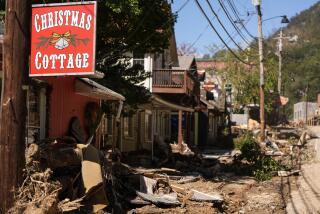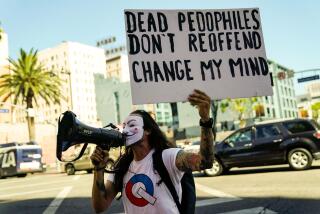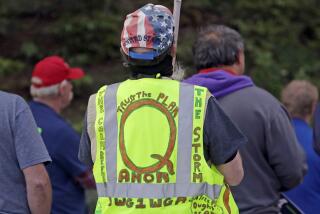Bin Laden raid gets little credence in conspiracy-minded Pakistan
Reporting from Abbottabad, Pakistan â It was all a ruse, Ejaz Ahmad sniffed. Osama bin Laden never lived in Abbottabad.
To Ahmad, the secret night raid by U.S. commandos, the staccato bursts of gunfire, the crash of the stealth helicopter and the reported killing of the Al Qaeda leader in a whitewashed compound just down the road were pure theater. The Americans made it all up to convince the world that terrorism exists everywhere in Pakistan.
âThen theyâll come in and take control of our nuclear weapons,â the 20-year-old college student said as he walked along a dirt path near the compound.
In Abbottabad and across the country, many Pakistanis remain unconvinced that Bin Laden was killed in a raid May 2. A poll conducted by international market research firm YouGov found that two-thirds of Pakistanis do not believe Bin Laden was killed last month by a team of U.S. Navy SEALs. Some people say either that Bin Laden died several years ago or that heâs still alive, waiting for the right time to reappear in public.
Such resistance to official accounts is not unusual in a country with a collective propensity to get swept up by conspiracy theories, analysts say. The profound skepticism shared by many Pakistanis is rooted in their deep distrust of the United States, their desire to protect their countryâs nuclear program, their impressions of world events outside Pakistan and their devotion to the preachings of hard-line clerics.
The suspicions, analysts say, give life to conspiracy theories nurtured by free but reckless media that provide exposure for Islamist-minded observers and others willing to raise doubts. Many television talk shows try to gobble up ratings with sensationalism and demonization of the West. The result, analysts say, is often too much scapegoating and not enough self-examination of Pakistanâs own problems, a form of denial.
One of the countryâs top conspiracy theory purveyors is Zaid Hamid, a defense analyst who wears a trademark red beret and routinely appears on Pakistani talk shows. Recently on YouTube, Hamid breathlessly talked of an Indian-Israeli-American axis that he said seeks to wrest control of the countryâs nuclear arsenal by secretly supporting terrorist groups within Pakistan to foment civil war.
One of those organizations, Hamid said in a telephone interview, is the Pakistani Taliban. The militant group has carried out scores of suicide bombings and assaults on Pakistani mosques, markets and security installations, including last weekâs militant siege of a Pakistani naval base in Karachi that killed 10 security personnel. Hamid doesnât doubt that the Taliban carried out the siege, but he insists that it did so at the behest of the U.S. and India.
âThe Pakistani Taliban is a dirty gang of the CIA. They are assassins working for RAW,â Hamid said, referring to Indiaâs main intelligence agency. âThe Pakistani Taliban is doing the dirty work for the CIA, creating enough anarchy in Pakistan to create a global case that Pakistanâs nuclear assets are not safe.â
Adherence to conspiracy theories is especially pervasive at mosques run by hard-line imams who take advantage of an audience that is usually poorly educated. Nearly half of the countryâs population is illiterate, and nearly a third of all children who attend school drop out by the fifth grade.
âThey preach all sorts of wrong things in the mosques,â said Javed Hussain, a retired brigadier and former Pakistani special forces commander. âAll over Pakistan, religious people have lionized Bin Laden. He became a hero. And now they refuse to believe heâs dead.â
But itâs not just the poorly educated masses subjected to hard-line sermons who get swept up in conspiracy theories. A 2008 U.S. diplomatic cable recently divulged by the WikiLeaks website and published in Pakistanâs Dawn newspaper discussed the strong anti-American bias that lecturers at the National Defense University, a leading military college in Islamabad, the capital, pass on to colonels and brigadiers taking coursework there.
According to the cable, U.S. Army Col. Michael Schleicher, who took a course at the university, reported that âcourse instructors often had misperceptions about U.S. policies and culture, and infused their lectures with these suspicions.â As a result, some students âthought the CIA was in charge of the U.S. media,â the cable said.
Pakistani lieutenant colonels and colonels taking the universityâs junior course track âshared many of the biases prevalent in the Muslim world, including a belief that the U.S. invaded Iraq for its oil, and that 9/11 was a staged âJewish conspiracy,â â the cable continued.
Last year, Maulana Fazlur Rehman, a leading hard-line cleric who heads the Islamist party known as Jamiat Ulema-i-Islam (Fazl), accused Washington of infiltrating Islamabad with more than 9,000 agents from Blackwater Worldwide, the controversial U.S.-based security firm now known as Xe Services. The Pakistani government quickly doused Rehmanâs claims as false, but conspiracy theories abound about the firm, including claims that it secretly engineers suicide attacks.
Pakistanâs reliance on conspiracy theories is not a benign obsession. Blaming the U.S. and India for everything thatâs wrong in their country allows Pakistanis to avoid holding themselves accountable.
Rasul Bakhsh Rais, a Lahore-based political analyst, called the situation a classic case of denial.
âThe most serious ramification of all this is that our society today relies on emotional sentiment rather than relying on facts,â Rais said. âConspiracy theories contribute to the rejection of pragmatism. And we need pragmatism to identify our problems and figure out the best way to resolve them.â
Large segments of Pakistani society buy into conspiracy theories because âof their inherent anti-Americanism and their inherent sympathy for jihadist elements,â he said.
When it came to Bin Laden, conspiracy theories about his fate had all sorts of trajectories. The Nation, a Pakistani daily historically critical of the West, asserted in a front page story that Bin Laden had blown himself up to avoid being captured by U.S. commandos arriving at his compound. An Iranian intelligence ministerâs claim that Bin Laden had died of an illness years ago received strong play on Pakistani airwaves and in newspapers.
In Abbottabad, some Pakistanis refuse to believe that their small military city, a tourist haven nestled in forested highlands far from Pakistanâs militant-infested tribal badlands along the Afghan border, could ever have become Bin Ladenâs last refuge. Theyâre sure the U.S. staged the raid and fabricated its outcome so that it could carry out future incursions into Pakistan and eventually establish the same military footprint America has in Afghanistan.
âI will put my hand on the Koran and swear Bin Laden was not here!â Nasir Khan, a 32-year-old farmer, shouted from the driverâs seat of his white van. âThe U.S. wants to create another Afghanistan here. And the Pakistani government plays along. They donât care about the peopleâs welfare. They just take whatever money they can get from the U.S.
âIt doesnât make sense that the Americans would kill such an important terrorist leader and then just throw his body into the sea,â Khan added. âWhen they actually catch and kill Bin Laden, they will carry his body through the streets of America to show everyone what they did.â
More to Read
Sign up for Essential California
The most important California stories and recommendations in your inbox every morning.
You may occasionally receive promotional content from the Los Angeles Times.










